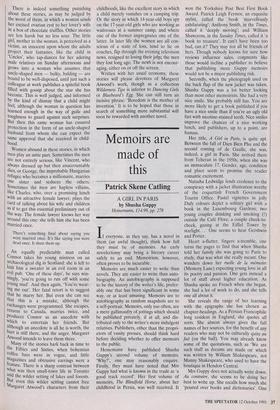More than sugar and spice
Anita Brookner
WILDERNESS TIPS by Margaret Atwood Bloomsbury, £14.99, pp. 247 Margaret Atwood's last published work was the excellent Cat's Eye, a novel which dismantled the notion of childhood innocence. The children concerned were little girls, who were revealed as being as unregenerate as the boys in Lord of the Flies. This was interesting — so interesting, indeed arresting, a notion that she has returned to the theme in many of the stories in this new collection. One would like to know whether the stories were born along with the novel or whether they came later: in any event, as might be noted, the anger here is sharper, as if it has had some- thing to work on. In the novel, revenge was wrought by nature and the passage of time. Here it is brought about by Margaret Atwood herself. There is indeed something punishing about these stories, as may be judged by the worst of them, in which a woman sends her excised ovarian cyst to her lover's wife in a box of chocolate truffles. Other stories are less harsh but no less sour. The little girl, mother to the woman, is perceived as a victim, an innocent upon whom the adults project their fantasies, like the child in `Uncles', who tap-dances for her adoring male relatives on Sunday afternoons and grows into a woman who assumes that uncle-shaped men — bulky, balding — are bound to be well-disposed, until just such a colleague at work publishes a spiteful book filled with gossip about the star she has become. This is well judged, and informed by the kind of dismay that a child might feel, although the woman in question has learned enough in the way of guile and toughness to guard against such surprises. But then this sanie woman has ensured protection in the form of an uncle-shaped husband from whom she can expect the same approval that she received in child- hood.
Women abound in these stories, in which men play an antic part. Sometimes the men are not entirely serious, like Vincent, who always dressed up but then unaccountably dies, or George, the improbable Hungarian refugee who becomes a millionaire, marries One sister and seduces the others. Sometimes the men are hapless villains, like Charles, who, over a promising lunch with an attractive female lawyer, plays the card of talking about his wife and children as if to get this essential preliminary out of the way. The female lawyer knows her way around this one: she tells him she has been married once.
There's something final about saying you were married once. It's like saying you were dead once. It shuts them up.
An equally predictable man called Connor takes his young mistress on an archaeological dig in Scotland: she is left to knit him a sweater in an evil room in an evil pub. 'One of these days', he says win- ningly, 'you're going to run off with some young stud'. And then again, 'You're wear- ing me out'. Her fatal retort is to suggest that he marry her. But even she can see that this is a mistake, although the exchanges were programmed. She escapes, returns to Canada, marries twice, and produces Connor as an anecdote with which to entertain her friends. But although an anecdote is all he is worth, the hurt is still there, and the anger. Margaret Atwood intends to leave them there.
Many of the stories hark back in time to the Fifties and Sixties, when bohemian coffee bars were in vogue, and little magazines and obtrusive earrings were a feature. There is a sharp contrast between what was then small-town life in Toronto and the wilder setting of lakes and forests. But even this wilder setting cannot free Margaret Atwood's characters from their childhoods, like the excellent story in which a child merely vanishes on a camping trip. Or the story in which 14-year-old boys spy on the 17-year-old girls who are working as waitresses at a summer camp, and where one of the former impregnates one of the latter. In later life the women are all con- scious of a state of loss, tend to lie on couches, flip through the evening television news, resigned to losing their jobs; the men they lost long ago. The neWS is not encour- aging, either on or off the screen.
Written with her usual economy, these stories will please devotees of Margaret Atwood's work, though as a collection Wilderness Tips is inferior to Dancing Girls or Bluebeard's Egg. She can still turn an incisive phrase: 'Boredom is the mother of invention.' It is to be hoped that those in search of something more substantial will soon be rewarded with another novel.



























































 Previous page
Previous page